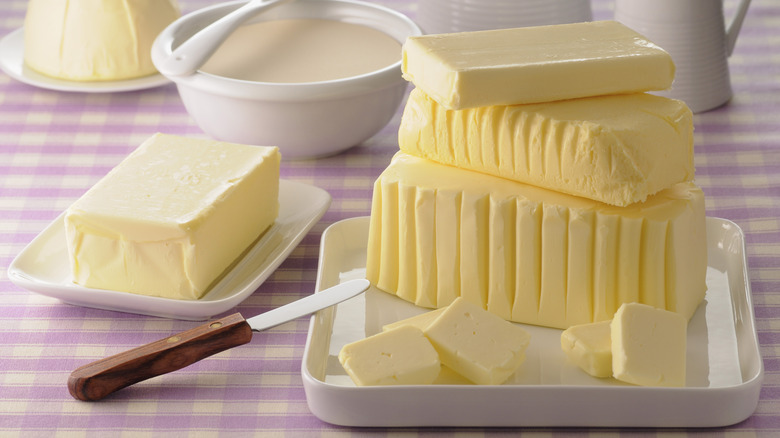The Best Butter For Baking, According To Alton Brown
We may receive a commission on purchases made from links.
Alton Brown is a trustworthy source when it comes to cooking and baking advice. Between his education from the New England Culinary Institute, very successful cooking shows, and cookbooks, he's practically an encyclopedia of culinary information. Naturally, fans reach out to him for cooking advice. During a segment for "The Late Show with Stephen Colbert," a viewer asked Brown what the best butter was for baking. Brown answered, "Most recipes are written for unsalted butter and, believe it or not, more expensive butter is actually usually better."
I can't help but wonder if the person asking the question was hoping to receive a specific brand recommendation, since there are sometimes dozens of butter choices at any given grocery store. But, we can learn some things from Brown's answer. Bakers benefit from using unsalted butter because it gives them full control over how much actual salt they put in the recipe. Even in sweet baked goods, salt is often called for, and is important for enhancing the flavor of the final dish. If you use salted butter, and then add more salt later, the baked dessert could end up being too salty.
Brown's recommendation for using more expensive butter likely means using higher quality butter, which naturally comes with a higher price tag than generic brands. To this point, Brown said, "Cheap grocery store, generic brands can contain up to twelve percent water, which very often is not factored into the recipe." With baked goods, extra water in butter can negatively effect the gluten activity in your dough.
Quality is more important than where a butter is from
Many chefs and pastry chefs will debate on the subject of American butter versus European butter. Alton Brown didn't give his take on his preference between the two, but only emphasized the importance of using higher quality butter. Interestingly enough, lauded French chef Jacques Pepin bakes with no other brand than Land O'Lakes, an American brand. Because European butters must have a higher butterfat content than American butters, many people may assume the former are superior (they also tend to be more expensive). But, honestly, with a few exceptions, American butter is fine to use for most baked goods.
American-style butters must have at least 80% butterfat, while European butters must contain at least 82% butterfat. However, lots of American brands make "European-style" butters, which contain a higher fat content. You'll want this higher fat content when you're making pastries that utilize lots of butter, like croissants and danishes, because a successful dough is dependent on the lamination process, in which butter plays a big role. While it might seem intimidating, making your own puff pastry is a great idea. But with things like cakes, cookies, and brownies, American butter is a great choice, so long as you take Brown's advice and use an unsalted, good quality one.

